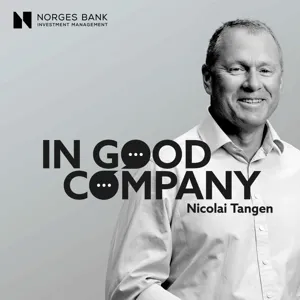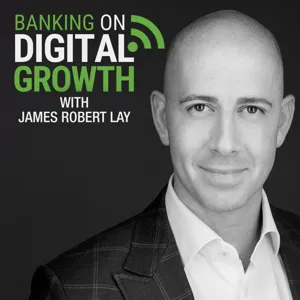Podcast Summary
CEO of Citigroup, Jane Fraser, discusses a challenging global economy and building corporate resilience: CEO Jane Fraser highlights the need for corporate resilience amidst a challenging global economy, the impact of late recognized inflation, and the importance of ESG and real-time data for informed decision making.
Jane Fraser, CEO of Citigroup, sees a challenging and desynchronized global economy, with a focus on building resilience in the corporate sector. Central banks were criticized for being late in recognizing inflation, which has affected various sectors including real estate, supply chains, and energy costs. The economy's health is a top concern, with inflation being a major indicator to watch. Corporations are also reexamining their business models and supply chains to adapt to the changing digital and AI world, with a renewed focus on ESG (Environmental, Social, and Governance) and security. Central banks' data may be lagging, making it essential for organizations like the Norwegian Sovereign Wealth Fund to have real-time information to make informed decisions.
Banks' Role in a Changing Financial Landscape: Banks, despite the rise of DeFi, remain crucial in the financial system due to their regulatory frameworks, investor protections, consumer protections, vast cross-border capabilities, and risk management services for multinationals.
The role of traditional banks, despite the growing popularity of decentralized finance (DeFi), remains crucial in the financial system. Central banks may change their approach to data, but the need for well-regulated financial institutions providing investor protections, regulatory frameworks, and consumer protections is essential. Banks, especially large global ones like Citi, have a competitive advantage due to their vast cross-border capabilities and the ability to provide risk management, data efficiency, and compliance services to the world's largest multinationals. While globalization is changing, the need for a well-regulated and interconnected financial system is more important than ever. The recent economic downturn highlighted the importance of banks' role in supporting clients and markets during times of stress. Citi, as a preeminent banking partner for institutions with cross-border needs, moves over $4 trillion in cash management, foreign exchange, and supply chains for the world's top 5,000 multinationals, making it 1,400 times bigger than the largest Fintech players.
Building more resilient supply chains and financing capabilities: Banks like Citigroup are investing in modern data and infrastructure, reducing governance, and simplifying organizational structures to better support businesses in today's global economy.
The global economy is changing, and businesses are responding by building more resilient supply chains and financing capabilities. This shift, which is evident in the growth of networks like Citigroup's, is a response to the lessons learned from recent crises and the need for less reliance on just-in-time models and more just-in-case redundancy. Another key takeaway is the importance of modern data and infrastructure for banks to support the scale and agility required in today's business environment. Citigroup, for example, is making significant investments in these areas to better position itself for the future. Lastly, Citigroup's ongoing "Bora Bora" or "org simplification" project reflects the need for banks to adapt their organizational structures and management processes to align with their current strategies, which often involve fewer, interconnected businesses serving a global client base. This requires a shift away from heavy governance and local management structures in favor of more streamlined, global platforms.
Bank undergoing restructuring for better agility and client delivery: Bank streamlines hierarchy, eliminates co-heads, reduces layers, and focuses on transparency and clear communication to deliver better to clients and meet regulatory requirements.
The organization is undergoing a significant restructuring process aimed at streamlining its hierarchy and improving its agility. This involves eliminating co-heads and reducing layers within the organization, ultimately leading to a more flattened structure. The restructuring process is being driven from the top and is intended to help the organization deliver better to its clients and meet regulatory requirements. The CEO is emphasizing the importance of transparency and clear communication with employees, encouraging them to focus on the bank's goals and either get on board or find another place to work. The CEO's approach is about being direct and clear, rather than being liked, and believes that there is no trade-off between excellence and empathy. The restructuring process is ongoing and the final number of employees in the bank is yet to be determined.
Empathy and Flexibility during the COVID-19 Crisis: Listening and adapting to employees' needs led to increased loyalty, stronger engagement, and positive client feedback during the COVID-19 crisis.
Empathy and flexibility were crucial for organizations during the COVID-19 crisis, leading to increased loyalty and stronger employee engagement. The speaker, a female executive at a global bank, emphasized the importance of listening and adapting to employees' needs, resulting in notable improvements in Voice of the Employee (VOE) results. She believes that the human element of an organization is essential, and the values and benefits of a global institution can provide opportunities for growth and development, especially for those from emerging markets. The bank's focus on empathy and care for its people and clients during the crisis was appreciated and led to positive feedback from clients. The executive's personal experience and deliberate choice to work for American institutions reflects her belief in meritocracy and the importance of supporting progress and the love for it within the organization.
Cities with a human touch are valuable in today's world: In today's world, cities with a human touch are valuable, especially in geopolitical tensions. AI in banking presents opportunities and threats, requiring responsible use. Constructive dialogue and communication are crucial in preventing conflicts from escalating, and AI can enhance human capabilities.
Cities with a human touch, rather than arrogance, are valuable in today's world. This was emphasized in the context of geopolitical tensions in the Middle East, Ukraine, and Russia. Regarding AI in banking, while it presents numerous opportunities, it also poses significant threats, particularly in the areas of cybersecurity and fraud. The use of AI should be seen as an aid to human creativity, not a replacement. In the current geopolitical landscape, the US-China relationship is a major concern, with the potential for technology decoupling and military engagement posing risks. Europe's competitiveness is also a worry for some. Despite these challenges, constructive dialogue and communication are crucial in preventing potential conflicts from escalating. AI, when used responsibly, can be a valuable tool in enhancing human capabilities and creativity.
Europe's defensive mindset hinders growth in sustainable technologies: Europe's protective and regulatory approach hinders entrepreneurship and innovation in sustainable technologies, while the US's incentives and innovation-driven culture allows for greater risk-taking and growth.
Europe is lagging behind in competitiveness due to a defensive mindset and lack of bold entrepreneurship, especially when it comes to investing in sustainable technologies. The US, on the other hand, excels in this area due to its incentives and innovation-driven culture. The European approach is more protective and regulatory, which hinders the growth of new opportunities. The American entrepreneurial spirit, along with fewer social security and healthcare concerns, allows individuals to take risks and pursue new ventures more freely. While Europe has its advantages, such as better infrastructure and resiliency, it needs to adopt a more offensive approach to stay competitive in today's rapidly changing global economy.
Importance of strong rule of law and diverse global mindset: Operating in weak rule of law environments underscores the value of a strong rule of law and diverse global mindset for corporate success, ensuring protection against abuses, corruption, and clarity in decision making.
Operating in environments with weak rule of law highlights the importance of this principle and its role in protecting against abuses, corruption, and ensuring clarity and security in decision making and investment. Additionally, having a diverse and global mindset, with a focus on excellence, is crucial for a successful corporate culture. The speaker, who has an international background and experience in Latin America, emphasizes the value of these lessons learned and the importance of continuous improvement towards achieving excellence. It may take several years to fully implement these cultural elements, but the benefits are worth the effort.
Continuous learning and improvement in leadership: Effective leaders prioritize progress over perfection, learn from experiences, and simplify complexities to succeed.
Effective leadership involves continuous learning and improvement, even for those with significant experience. The culture of an organization can impact the ability to deliver excellence, and simplifying certain elements can make it easier for individuals to succeed. An excellent leader is someone with a proven track record, humility, clarity of vision, and the ability to execute. Age and experience play a role in leadership, as accumulated experiences help leaders understand their own flaws and learn from them. However, it's important for leaders to avoid driving themselves too hard and prioritize progress over perfection to maintain a healthy perspective and effective decision-making abilities.
Navigating Crises as a Financial Executive: Adaptability and Prioritizing Self-Care: Financial success requires adaptability, crisis management skills, and self-care. Adapt to various experiences, prioritize self-care, and focus on core strengths during crises.
Having a diverse range of experiences is crucial for success in the financial industry. Jane, a high-ranking executive, shares how she learned the importance of adaptability and crisis management after becoming a mother and facing major global events like earthquakes, hurricanes, pandemics, and wars. She emphasizes that being adept at various aspects beyond deal structuring, such as people management and risk assessment, is essential when leading a firm. Her most formative experience was navigating the World Financial Crisis, where she learned to be bold and disciplined, and refocused on the bank's core strengths. To cope with stress, she prioritizes self-care, including proper nutrition, sleep, and family time, and practices good breathing techniques.
The importance of proper breathing and personal interests for well-being: Proper breathing leads to relaxation and increased energy, while personal interests contribute to mental and emotional health. Practice good posture and belly breathing, and make time for hobbies.
Proper breathing, achieved by sitting correctly with an aligned body and breathing from the belly instead of the chest, can lead to relaxation and increased energy. This practice, which some consider a form of meditation, can be more effective than traditional meditation for some individuals. Additionally, finding time for personal interests, such as traveling or reading, is essential for maintaining mental and emotional well-being. Lastly, young people are encouraged to embrace each phase of their lives and not put too much pressure on themselves to have it all at once. Instead, they should enjoy the journey and make the most of each decade of their lives.




